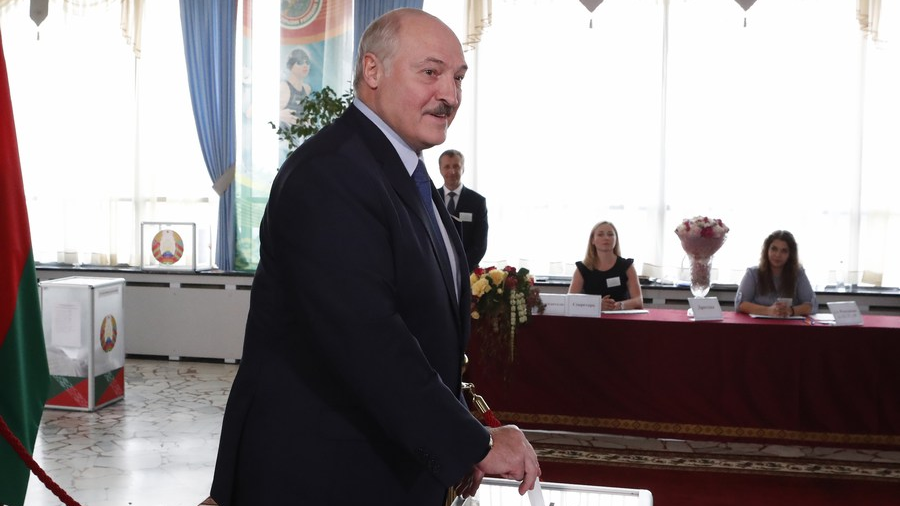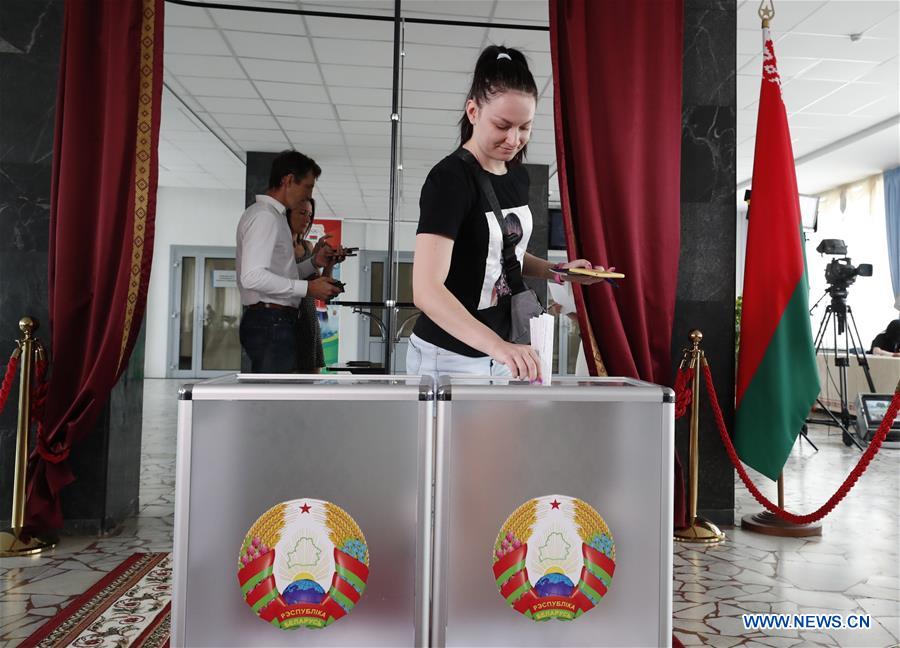
Belarusian President Alexander Lukashenko casts his ballot at a polling station in Minsk, Belarus, August 9, 2020. /Xinhua
Belarusian President Alexander Lukashenko casts his ballot at a polling station in Minsk, Belarus, August 9, 2020. /Xinhua
Editor's note: Nikola Mikovic is a freelance journalist based in Serbia. He covers mostly Russian, Ukrainian and Belarusian foreign policies, and writes for multiple web magazines. The article reflects the author's opinions, and not necessarily the views of CGTN.
Belarusian President Alexander Lukashenko won the presidential election on August 9, but his victory appears to be a Pyrrhic one. The opposition, as well as certain Western countries, did not recognize the official results. Mass protests, nationwide strikes and road blockades have since been staged with a demand for new elections. Will the Belarusian leader manage to stay in power or is his overthrow just a matter of time?
Protests in Belarus erupted right after the polling stations were closed, as supporters of Lukashenko's main rival Svetlana Tikhanovskaya came out on the streets claiming that the election was rigged.
Belarusian riot police were more than ready for a potential coup d'état. The security forces used rubber bullets, teargas and water cannons to disperse protesters who threw Molotov cocktails at the police. Both sides kept accusing each other of starting a provocation. Hundreds of demonstrators and police officers were injured. Clashes continued for the next couple of days.
Suddenly, Belarusian authorities then completely changed their approach toward mass protests. Police were withdrawn from the streets, allowing opposition supporters to freely march not only in the capital Minsk, but all over the country.
According to reports, in some provincial towns security forces cheered and even joined protesters. In spite of that, protesters did not dare to try to capture government buildings, which was a scenario that was seen in Ukraine in 2013 and 2014.
Unlike demonstrators in Kyiv's Maidan Square, who were firm about fighting against the police, in Belarus, the opposition supporters are now mostly peaceful. Thus, at least at this point, the current events in Minsk can be compared to the so-called Ukrainian Orange Revolution in 2004, rather than to violent Maidan demonstrations that resulted in the overthrow of allegedly pro-Russian Ukrainian President Viktor Yanukovych in 2014.
On the other hand, it is worth noting that in Minsk, ambassadors from EU countries, and representatives of the U.S. embassy and other countries, laid flowers at Pushkinskaya metro station, where one protester died. Such an action reminds of the famous Maidan scene when Victoria Nuland, at the time a high-positioned U.S. diplomat, handed out cookies to anti-Yanukovych protesters.
Unlike Yanukovych, who was constantly stepping back, Lukashenko seems determined to fight and is showing no will to allow European mediators to interfere in a Belarusian political crisis. Several European Union officials have already been denied entry to Belarus. Apart from small concessions such as the release of detained protesters, Lukashenko so far refuses to fulfill any of the crucial opposition demands.
The protests itself, as long as they are peaceful, can hardly be interpreted as a major threat to Lukashenko.

A voter casts her ballot at a polling station in Minsk, Belarus, August 9, 2020. /Xinhua
A voter casts her ballot at a polling station in Minsk, Belarus, August 9, 2020. /Xinhua
For instance, on August 16, tens of thousands of anti-Lukashenko protesters gathered in Minsk, stood at the World War II memorial monument for a couple of hours, walked to the city center and then went home. A day earlier, workers who are on strike marched to the government building in the capital. Riot police were standing at the stairs. Although the situation was tense, workers and demonstrators voluntarily dispersed. Some analysts claimed that the crowd went home as "nobody wanted to die as Lukashenko's days in power are numbered anyway."
Such an approach is unlikely to lead to Lukashenko's resignation unless Russia and the West put serious pressure on him. It is not very probable that the Belarusian president, who has been in power for the past 24 years, will step down just because protesters are standing outside shouting "Lukashenko must go."
Nationwide strikes, on the other hand, are a serious attempt to weaken Lukashenko's position. More and more state-owned enterprises are joining strikes and protests, and that could do serious damage to the economy.
However, even if labor stoppages continue and keep growing, that does not necessarily mean Lukashenko will resign. Workers who participate in strikes are shooting themselves in the foot as their salaries can be reduced. And even if their demands eventually get fulfilled and Lukashenko goes, in a new Belarus the vast majority of those employees are expected to lose their jobs, as their enterprises will likely be privatized, or even shut down.
Lukashenko can stay in power as long as he is supported by the security apparatus, although his legitimacy has already become quite questionable.
It is worth remembering that protesters in Kyiv during the violent Maidan clashes drew graffiti on houses where Berkut riot police members lived in an effort to put pressure on the entire police department. Also, Maidan activists used shields, gas masks and other equipment to fight the riot police.
There are unconfirmed reports that protesters in Belarus have started forming groups that will "resist police brutality," even though there was not a single case of police intervention over the past week. If that happens, it will be a clear indication that the situation will radicalize.
Unlike Iranian and Venezuelan leaders, the Belarusian President cannot count on "people's militias" and his own supporters who would be ready to clash with anti-government protesters. In addition, he is the only European leader that does not have a strong political party to back him, which makes his position even more difficult. He cannot even count on Russia's help, as the Kremlin is not showing any interest in preserving the status quo in Belarus.
Therefore, he can stay in power for some time, but his position will continue to weaken. Essentially, it remains to be seen if he will keep fighting until the end, at any cost, or if he will eventually step down. In any case, Lukashenko's political career is coming to an end.
Given that the opposition does not have any program or ideas except a "Lukashenko must go" slogan, the fate of the post-Lukashenko Belarus will heavily depend on lucrative deals between the Kremlin and Western powers.
(If you want to contribute and have specific expertise, please contact us at opinions@cgtn.com.)